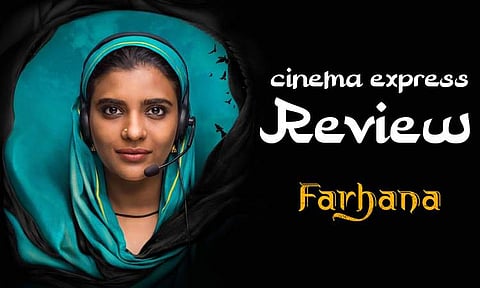Farhana Movie Review: A conversation, confinement, and solace stir this engaging drama
Rating:(3 / 5)
At one point in Farhana, Selvaraghavan's Dhayalan says that a face is a blanket of oneself that an individual does not wish to see. This statement plays on an undercurrent tone, as well, when Farhana cleverly chooses to play with Dhayalan's physical identity and use it as equipment of sorts to bring the film's necessary diabolical shift. A strange psyche is also in place, and Selvaraghavan's presence, too stirs the conflict that Farhana poignantly rests upon.
Farhana's (Aishwarya Rajesh) hijab never leaves her ears, but the fierceness of tucking in reduces gently. Over time, we realise how Farhana's relationship with her hijab stands as a metaphor for her metamorphic growth. It is a relief to see that Farhana's religious identity is never sacrificed, compromised, or criticised, thus correcting recent films that take the onus of talking about issues for women, with maybe not-so-noble intentions.
Director: Nelson Venkatesan
Cast: Aishwarya Rajesh, Selvaraghavan, Jithan Ramesh, Anumol, Aishwarya Dutta, Kittu, and others
Farhana comes from a staunch, lower-middle-class Indian Muslim family. She is seen wearing a Metti (toe ring), prays five times a day irrespective of the place and situation, and shoulders household responsibilities. The initial 30-odd minutes rivetingly reflect the confinement that Farhana goes through while living with her husband Karim (Jithan Ramesh). Even as he, who runs a footwear store, expresses a subtle support for Farhana by getting a new pair of work footwear, there seems a confinement that she is looped into.
She is someone, who is restrained from dancing at her friend's wedding and having a cell phone, considered more impious by her father Ajeez Bhai (Kittu). Nelson Venkatesan delectably sets up the world of Farhana so much that you heave a sigh of relief along with her when she steps into her office for the first day of work with her newly bought favourite handbag. And she says it is "jolly" even when the smallest weight is put down.
Her job at the call centre does not come with her pursual of passion, but rather proceedings of poverty that drives Farhana's decision. And just like any other middle-class thought process, Farhana wishes for more, which puts her in a situation that also comes with vexatious results.
One of the most heart-warming themes of Farhana that propel the central conflict is solace. Nelson makes a compelling argument for how it becomes child's play to open up to someone whose identity is not involved. Farhana also encounters a situation where she is expected to talk to lonely, pervert men for as long as possible. It is also left to interpretation if the callers are only men and if only women are on the other side. Perhaps, a commentary on how sexually liberating talks are yet to be made by women or that men are yet to hear what women got to say. But that's a discussion for another day. Let's come back to Farhana.
Amidst those wanting to know her body type, comes a voice who wants a conversation of silence, in-between the sounds of water, wind chimes and guitar strings. The conversation-driven stretch makes up for the heart of the film, humbly dismissing how the number of people around you does not matter in front of the number of ears that will pay heed to your silences. There is indeed a poetic stretch of understanding between strangers until Farhana decides to make a tonal shift in its genre.
There is a religious touch to this, and strangely, a Hindu reference to Lakshman Rekha is drawn to bring out an emphasising effort of Farhana moving out into the danger zone, or can we say a battleground where she is the warrior and saviour of herself?
Farhana is effectively anchored by its cast, primarily led by Aishwarya Rajesh. Her portrayal of a Muslim does not only come up with the actor's smart performance but also with in-depth writing. There is no alienation of sorts, and it is wise that Farhana's Islamic identity is never an example of tokenism to show women from a minority community or for milking the religion for its gender-bias practices. Instead, the film understandably takes you into the world of a subjugated woman just against the backdrop of a Muslim household. But what adds to this is the supporting cast that brilliantly sums up the world of the film. Kittu as the staunch elderly patriarch, who is taken aback that Farhana bought a new phone for herself, free-wheeling Sophie (Aishwarya Dutta), and an accepting colleague Nithya (Anumol), to name a few. While Jithan Ramesh carries the role with ease as a husband who goes to all lengths to be progressive within the frameworks of a typical Indian patriarchal house, Selvaraghavan adds a touch of psyche exampling.
At times, Farhana lacks due to tepid stretches, especially in the latter half. But for the storytelling shift that it takes, the film fairly understands itself and gets past it with noble intentions and promises. Farhana is a film that effectively brings the themes of solace, independence, and most importantly, the message that worldly notions need not leave one bereft of their fundamental rights.

